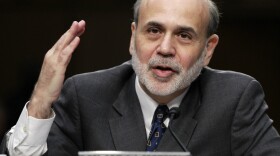
Robert Smith
Robert Smith is a host for NPR's Planet Money where he tells stories about how the global economy is affecting our lives.
If that sounds a little dry, then you've never heard Planet Money. The team specializes in making economic reporting funny, engaging and understandable. Planet Money has been known to set economic indicators to music, use superheroes to explain central banks, and even buy a toxic asset just to figure it out.
Smith admits that he has no special background in finance or math, just a curiosity about how money works. That kind of curiosity has driven Smith for his 20 years in radio.
Before joining Planet Money, Smith was the New York correspondent for NPR. He was responsible for covering all the mayhem and beauty that makes it the greatest city on Earth. Smith reported on the rebuilding of Ground Zero, the stunning landing of US Air flight 1549 in the Hudson River and the dysfunctional world of New York politics. He specialized in features about the overlooked joys of urban living: puddles, billboards, ice cream trucks, street musicians, drunks and obsessives.
When New York was strangely quiet, Smith pitched in covering the big national stories. He traveled with presidential campaigns, tracked the recovery of New Orleans after Hurricane Katrina and reported from the BP oil spill.
Before his New York City gig, Smith worked for public radio stations in Seattle (KUOW), Salt Lake City (KUER) and Portland (KBOO). He's been an editor, a host, a news director and just about any other job you can think of in broadcasting. Smith also lectures on the dark arts of radio at universities and conferences. He trains fellow reporters how to sneak humor and action into even the dullest stories on tight deadlines.
Smith started in broadcasting playing music at KPCW in his hometown of Park City, Utah. Although the low-power radio station at Reed College in Portland, Oregon, likes to claim him as its own.
-
The Amish don't drive and don't connect to the electrical grid. Yet a growing number of Amish people are leaving farming for manufacturing. That means they need tools — and power.
-
"We should think of doctors the same way we think of shirts," an economist says. "If we can get doctors at a lower cost from elsewhere in the world then we could save enormous amounts of money."
-
It was a not an easy day for voting in parts of the Northeast. Communities hit hard by last week's Hurricane Sandy saw long lines and confusion at polling places. Some voters had to fill out emergency ballots.
-
The aftermath of Superstorm Sandy has complicated voting in the New York City area. Robert Siegel talks with Robert Smith.
-
Lynn Neary talks with Robert Smith, who was covering Election Day in New York.
-
The Fed has the power to create money. But it has another, critical power: The power of words.
-
"People don't really see it as a badge of honor anymore," one entrepreneur says — and goes on to list three reasons why going public is more trouble than it's worth.
-
Correspondent Robert Smith discovered an obscure but critical interest rate when he took out a mortgage. Now the world is learning how that rate was manipulated.
-
Many religious traditions stress the importance of charity. But Mormons are remarkable for the amount and the precision with which they give to their church.
-
In New Hampshire — and across the country — the economy and job-creation are ranked by voters as the most important issues. Front-runner Mitt Romney wants to shrink government. All the GOP candidates want to balance the budget and cut business and personal taxes.






